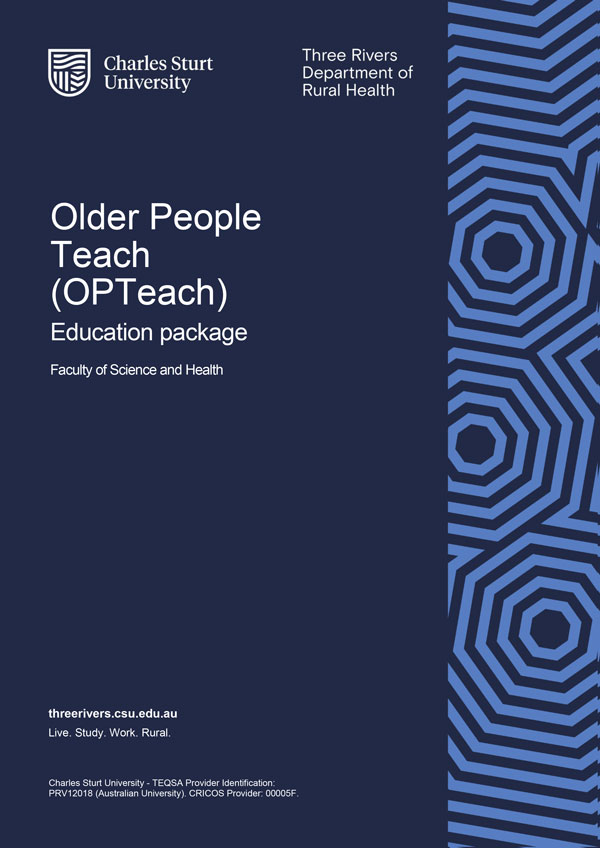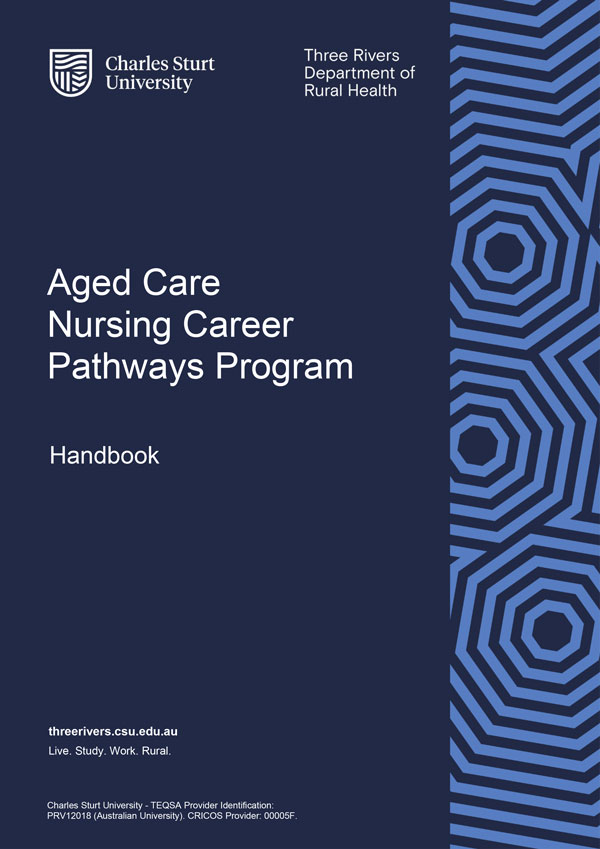Placements working with older people
'Live and Learn: A unique aged care opportunity' is a distinctive clinical placement hosted in facilities providing services to older people in rural communities. You will have the opportunity to learn about care conducted over a full 24-hour period and how this is coordinated by enrolled nurses and assistants in nursing under the supervision and guidance of a registered nurse.
These placements allow you to receive a dynamic learning experience that will help you develop skills and attributes fundamental to your ongoing clinical practice. The comprehensive services delivered in aged care facilities will enhance your understanding of the true meaning of holistic care.
Working in aged care can be complex and challenging, but the rewards are many and adequate preparation for placement can help dispel some of the myths and fears you might have about caring for the elderly.
What you will learn
- Structured patient assessment strategies and care of the deteriorating patient with application of evidence-based practice in both acute and chronic settings
- Critical analysis and problem-solving skills
- Expand your communication skills
- Hone your foundational clinical skills
- Build your knowledge of medications
- Manage complex co-morbid physiology
- Undertake service-learning placements within a supportive and enriching environment.
Benefits
- Enjoy a person-centred and family-inclusive care model
- Consolidate your foundational learning
- Live and work among friendly locals and embrace the country life
- Undertake a culturally immersive journey with local First Nations Elders
Placement structure
Clinical placements in aged care occur in many different forms across health disciplines. They may be part of other placement models, such as traditional placements, service learning placements, or interprofessional learning placements.
Case study
Student and early career nurses working in aged care settings can focus on acquiring and growing foundational skills in an environment that permits and encourages reflexive and reflective practice.
Charles Sturt nursing student Kathryn Box had this to say about her first-ever clinical placement:
One of my favourite experiences during my placement at Navorina Nursing Home in Deniliquin was listening to Gwenda Darling about her life experiences as a person with dementia. It was really eye-opening and gave an excellent insight into dementia and how it impacts people’s lives. She explained the importance of patient-centred care and listening to residents about their concerns and issues they may have.
Additionally, the great thing about this particular placement was that I was given the opportunity to see and learn about the whole picture of age care. I witnessed many procedures in all facility sections, which allowed me to gain knowledge to improve my future nursing practice.
“Every older Australian receiving aged care deserves to receive safe, quality care that is best practice, tailored to their needs, and optimises their health and wellbeing.” (Interim Report of the Royal Commission into Aged Care Quality and Safety)
Knowing the needs and desires of older persons in residential care is a key requirement for success in this field. Our modules and links to validated resources may help you prepare for this exciting workplace learning experience.
Resources for teaching and learning in aged care settings
The Older People Teach (OPTeach) education package is a program that supports educators and mentors in involving older people in the teaching of ageing. It provides resources that can be freely used so that older people feel safe, valued, and respected in the education experience.
The Aged Care Career Pathway Program (ACCPP) supports early-career registered nurses new to the aged care sector. It is focused on building the knowledge, skills, attitudes, and confidence required to support the health and wellness of older people and consider the complex issues experienced by some older people. The information in this program is supplementary to the more detailed information provided to nurses by their employers.
Download a PDF of the Aged Care Nursing Career Pathways handbook
-
Online learning modules and quizzes chevron_right
Learning modules
We offer a suite of free and self-paced online learning modules, which can be accessed at CareerLab – Rural Health Education. These modules are designed to help you get started on your journey and to ensure you make the most out of every placement opportunity – particularly those in rural communities.
You can complete each module individually and will receive a certificate of completion for each module. These modules take between one and three hours to complete and include:
- Why rural? Try rural! (1 hour)
- Pre-placement preparation (1 hour)
- Developing cultural awareness for placement and future practice (2.5 hours)
- Electronic medical records (eMRs) (2 hours)
- Breaking bad news (1 hour)
- Student resilience and wellbeing (1.5 hours)
- Telehealth – Embracing technology in healthcare (1–3 hours)
Quizzes
‘Am I Ageist?’ Ageism against older people is stereotyping, discrimination and mistreatment based solely on a person’s age. It is very common in Australia, and without realising it, most of us are at least a little bit ageist at times.
Do this fun, two-minute quiz to see where you sit on the ageism spectrum.
How much do you know about the Code of Conduct for Aged Care? Do the Your Code - Self‑assessment quiz to find out.
Can you answer these basic nursing questions? Check out this fun and educational quiz to assess your nursing knowledge.
-
Additional information and resources chevron_right
The Australian Primary Health Care Nurses Association (APNA) have gathered resources on various topics that are useful to nurses working in aged care.
Produced by the Murrumbidgee Primary Health Network and Murrumbidgee Local Health District, the Acute Care Decision Guidelines govern interventions in residential aged care facilities.
The Australian Commission on Safety and Quality in Healthcare’s Medication Safety Standard aims to ensure clinicians safely prescribe, dispense and administer appropriate medicines and monitor medicine use. It also seeks to ensure consumers are informed about medicines and understand their own medicine needs and risks.
The MIMS Online is an important Australian online resource for pharmaceutical information. It is the web version of the MIMS prescribing information for pharmaceuticals available in Australia.
The Western Australia Department of Health has produced a toolkit for collecting and using patient stories for service improvement.
The Australian National Aged Care Classification (AN-ACC) funding model provides equitable funding to approved providers to deliver care to residents living in residential aged care services.
-
Useful links chevron_right
Websites
Clinical Excellence Commission: Pressure injury prevention
Safety and Quality: Preventing pressure injuries and wound management
Continence Foundation of Australia
Clinical Excellence Commission: Last days of life
NSW Health: Making an Advanced Care Directive
NSW Health: Voluntary assisted dying in NSW
Videos
ABC – You Can’t Ask That: Dementia (30 min)
ABC – You Can’t Ask That: Indigenous (21 min)
SBS Insight – Voluntary Assisted Dying (52 min) Warning: strong emotional triggers
Quick links
Quality Standards | Aged Care Quality and Safety Commission


